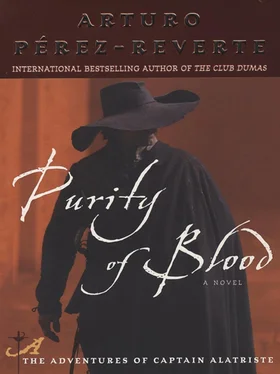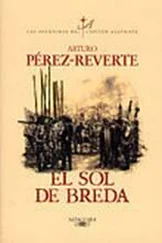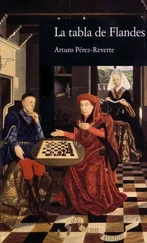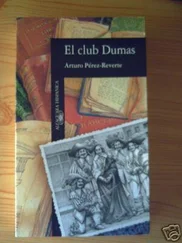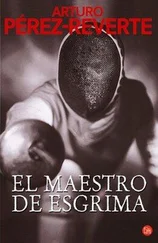Arturo Pérez-Reverte - Purity of Blood
Здесь есть возможность читать онлайн «Arturo Pérez-Reverte - Purity of Blood» весь текст электронной книги совершенно бесплатно (целиком полную версию без сокращений). В некоторых случаях можно слушать аудио, скачать через торрент в формате fb2 и присутствует краткое содержание. Жанр: Старинная литература, на английском языке. Описание произведения, (предисловие) а так же отзывы посетителей доступны на портале библиотеки ЛибКат.
- Название:Purity of Blood
- Автор:
- Жанр:
- Год:неизвестен
- ISBN:нет данных
- Рейтинг книги:3 / 5. Голосов: 1
-
Избранное:Добавить в избранное
- Отзывы:
-
Ваша оценка:
- 60
- 1
- 2
- 3
- 4
- 5
Purity of Blood: краткое содержание, описание и аннотация
Предлагаем к чтению аннотацию, описание, краткое содержание или предисловие (зависит от того, что написал сам автор книги «Purity of Blood»). Если вы не нашли необходимую информацию о книге — напишите в комментариях, мы постараемся отыскать её.
Purity of Blood — читать онлайн бесплатно полную книгу (весь текст) целиком
Ниже представлен текст книги, разбитый по страницам. Система сохранения места последней прочитанной страницы, позволяет с удобством читать онлайн бесплатно книгу «Purity of Blood», без необходимости каждый раз заново искать на чём Вы остановились. Поставьте закладку, и сможете в любой момент перейти на страницу, на которой закончили чтение.
Интервал:
Закладка:
“By God, Íñigo”—the captain seemed to be speaking to me, although he was staring hard at the offender—“I do believe that this caballero has confused you with some rogue of his acquaintance.”
I said nothing, not a word, for it was obvious what was happening. The coxcomb, hearing himself addressed, had stopped, and his companions with him. He was the kind of man who uses his own shadow as a kind of mirror. At the captain’s “By God,” he had placed a white hand displaying a large gold and diamond ring upon the guard of his sword, and with the evident sarcasm of that “caballero,” his fingers drummed a tune on the pommel. His arrogant eyes looked Diego Alatriste up and down. When he had completed the inspection, however—after noting the captain’s sword with the guard scratched and nicked from other blades, the battle scars on his face, the cold eyes beneath the broad-brimmed hat—the arrogance was not quite as noticeable as it had been.
Even so, he replied. “And what happens,” he said disagreeably, “if I am not confused and if I am certain of what I say…eh?”
His answer had sounded firm, which was in the man’s favor, although that final hesitation had not escaped me, nor the swift glances he threw toward his companion and the two ladies. In those days, a man might well let himself be killed for the sake of his reputation, and the only things that could not be forgiven were cowardice and dishonor. After all, honor was supposed to be the exclusive patrimony of the hidalgo; and the hidalgo, unlike the plebeian who bore all the tributes and taxes, neither worked nor contributed to the royal treasury. The famous plays of Lope, Tirso, and Calderón often made reference to the chivalric tradition of earlier centuries, but what actually set the tone of the society was the prevalence of scoundrels and swindlers of every stripe. Those hyperboles of honor and dishonor glossed over the business—quite serious, of course—of living without working or paying taxes.
Very slowly, taking his time, the captain ran two fingers over his mustache. And then, with the same hand, without ostentation or exaggeration, he pulled back his cape, further exposing, in addition to his sword, the dagger he wore over his kidney, on the left side.
“What happens,” Alatriste replied in measured tones, “if you are not confused? Well, perhaps Your Mercies may find the troublemaker whom I am sure you have mistaken for this lad, if you will come along with me to the de la Vega gate.”
The de la Vega gate, which was not far away, was one of the places on the outskirts of the city where men went to resolve their quarrels. And the gesture of freeing up, without further preamble, the Toledo and Biscay weapons had not gone unnoticed by anyone present. Nor had the plural, “Your Mercies,” which brought his companion into the game.
The women raised their eyebrows, intrigued, for their gender was a guarantee of safe conduct, allowing them to be privileged spectators. For his part, the second individual—another popinjay distinguished by his goatee, large lace collar, and suede gloves—who had witnessed the prologue with a superior smile, suddenly stopped smiling. It was one thing to go for a stroll with a friend and to bluster a bit before the two ladies, but it was a far different matter to find oneself in a confrontation with a fellow who had the look of a soldier and who, out of the blue, was suggesting they bypass formalities and settle the business immediately with their swords. The companion’s expression said, This is not one of those all-for-show braggarts you see on Calle Montera, and he communicated this thought further by quietly moving back a few steps. As for the pretty-boy himself, his pallor betrayed that he was thinking exactly the same thing, although his position was more delicate. He had spoken a little too freely, and the problem with words is that once spoken, they cannot find their way back to the speaker alone. Sometimes they have to be returned on the tip of a sword.
“The boy was not to blame,” said the companion.
He had spoken like an hidalgo, voice firm and calm, but conciliation was evident in his words. He wanted to remove himself from the center of things and in addition provide his friend with a way out, giving him a foothold whereby he could end the incident without his doublet slashed as generously as his sleeves.
I saw the dandy uncurl the fingers of his right hand and then close them again. He hesitated. Things could be worse. By pure arithmetic, it was two against one, and had he discovered the least sign of discomfort or emotion in Diego Alatriste he might have gone forward—on de la Vega hill, or right there. But there was something about the captain’s cool demeanor, an indifference so absolute that it transcended his immobility and his silences that counseled “proceed with great caution.” I knew exactly what was going through his head: a man who challenges a pair of well-armed strangers either is very sure of himself and his sword, or he is mad. And neither of the two possibilities was to be treated lightly. Even so, I have to say that the caballero was not fainthearted. He did not want to fight, but neither did he want to lose face; so for a few instants more he locked eyes with the captain. Then he looked toward me, as if seeing me for the first time.
“I agree that the boy was not to blame,” he said finally.
The women smiled, though not without a little disappointment at being deprived of entertainment. The friend contained a sigh of relief. As for me, it did not matter whether the pretty-boy apologized or not. I was attuned to Captain Alatriste’s profile beneath the brim of his hat, his thick mustache, his chin, badly shaved that morning, his scars, the gray-green, expressionless eyes that had looked into a void only he could contemplate. Then I looked at his worn and mended doublet, the ancient cape, the modest collar washed time and time again by Caridad la Lebrijana, the dull reflection of the sun on the sword guard and dagger grip protruding from his belt. And I was conscious of a dual and magnificent privilege: that man had been my father’s friend, and now he was also mine, ready to fight on my behalf over a mere word.
Or maybe, in truth, he was doing it for himself. Perhaps the king’s wars, the patrons who hired his sword, the friends who embroiled him in dangerous undertakings, the loose-tongued fops and dandies, even I myself, were simply pretexts that allowed Alatriste to fight because—as don Francisco de Quevedo would have said—there was no choice but to fight, regardless of God, and against whatever there was to be against. And don Francisco himself was now hurrying to join us, sniffing a conflict, though a bit late.
I would have followed Captain Alatriste to the Gates of Hell at one word, one gesture, one smile. I was far from suspecting that that was precisely where he was leading me.
I believe I have already spoken of Angélica de Alquézar. Over the years, when I was a soldier like Diego Alatriste—and played other roles that will be told in good time—life placed women in my path. I am not given to the bluff and bluster of the tavern, nor to lyrical nostalgia, but since the tale demands some comment, I shall boil the matter down and state that I loved a certain number of them, and that I recall others with tenderness, indifference, or—most often the case—with a happy and complicit smile. That is the highest laurel a man may hope for, to emerge from such sweet embraces unscathed, with his purse little diminished, his health reasonable, and his esteem intact.
That being said, I shall affirm to Your Mercies that of all the women whose paths crossed mine, the niece of the royal secretary, Luis de Alquézar, was without doubt the most beautiful, the most intelligent, the most seductive, and the most evil. You will make the objection, perhaps, that my youth may have made me excessively vulnerable—remember that at the time of this story I was a lad from the Basque country, not yet fourteen, who had been in Madrid no more than a year. But that was not the case. Even later, when I was a man grown and Angélica was in the full bloom of her womanhood, my sentiments were unchanged. It was like loving the Devil, even knowing who he is.
Читать дальшеИнтервал:
Закладка:
Похожие книги на «Purity of Blood»
Представляем Вашему вниманию похожие книги на «Purity of Blood» списком для выбора. Мы отобрали схожую по названию и смыслу литературу в надежде предоставить читателям больше вариантов отыскать новые, интересные, ещё непрочитанные произведения.
Обсуждение, отзывы о книге «Purity of Blood» и просто собственные мнения читателей. Оставьте ваши комментарии, напишите, что Вы думаете о произведении, его смысле или главных героях. Укажите что конкретно понравилось, а что нет, и почему Вы так считаете.
